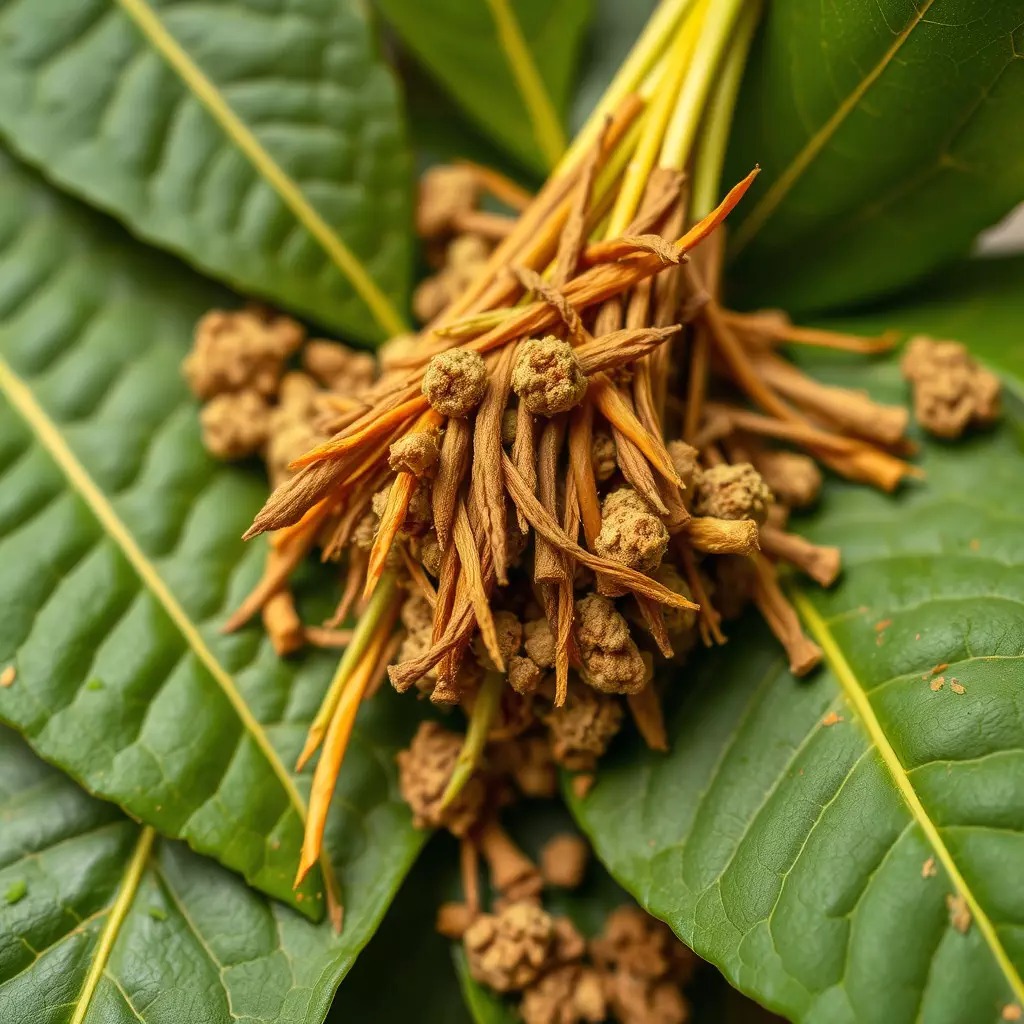Kratom, a plant from Southeast Asia, has garnered attention for its potential role in managing stress and providing a natural energy boost. Its alkaloids, like mitragynine and 7-hydroxymitragynine, interact with opioid receptors and neurotransmitter systems, offering a calming effect and alleviating anxiety while promoting well-being. These compounds can also activate alpha and beta neurotransmitters to enhance energy without the side effects typically associated with caffeine or synthetic stimulants. As a natural alternative to pharmaceuticals, kratom holds promise for stress management, but users must navigate its varying effects according to dosage, strain, and individual physiology, and consider its legal status across different countries. Preliminary studies are examining its effects on hormonal balance and adrenal function, suggesting a potential adaptogenic property in regulating cortisol levels. For those interested in incorporating kratom into a holistic health approach, it's crucial to do so under the guidance of a healthcare professional, as part of a balanced lifestyle that includes proper diet, exercise, mindfulness, and sleep for optimal energy and well-being. The combination of kratom with these healthy practices can lead to improved stress management and sustained vitality.
Stress response regulation is a cornerstone of maintaining health and vitality. An emerging topic in this domain is the role of Kratom, a plant-based compound, in modulating stress responses and providing natural energy boosts. This article delves into the scientific mechanisms that underpin Kratom’s influence on hormonal equilibrium and adrenal function, offering insights into how it can be integrated into a holistic lifestyle for enhanced stress management and sustained vitality. Explore the potential of Kratom as a complementary approach to support your body’s natural ability to cope with stressors and experience invigorating energy levels.
- Unlocking the Potential of Kratom for Stress Response Regulation and Natural Energy Boosts
- The Science Behind Kratom's Impact on Hormonal Balance and Adrenal Function
- Integrating Kratom into a Holistic Lifestyle for Optimal Stress Management and Vitality Maintenance
Unlocking the Potential of Kratom for Stress Response Regulation and Natural Energy Boosts

Kratom, a tropical tree native to Southeast Asia, has garnered attention for its potential role in stress response regulation and natural energy boosts. The leaves of kratom contain alkaloids, such as mitragynine and 7-hydroxymitragynine, which interact with the body’s opioid receptors, offering a modulatory effect on the nervous system. This interaction can lead to an attenuation of stress responses by binding to mu-opioid receptors, thereby mimicking the effects of endorphins and enkaphalins. As a result, individuals may experience a reduction in anxiety and an increase in feelings of well-being. Additionally, kratom’s alkaloids can stimulate alpha and beta neurotransmitters, which are responsible for the body’s natural energy production, providing an energy boost without the jittery side effects often associated with caffeine or synthetic stimulants. This dual action makes kratom a compelling subject of study for those seeking natural ways to regulate their stress response and enhance their vitality.
The use of kratom for stress response regulation should be approached with caution, as its effects can vary significantly among individuals, depending on dosage, strain, and personal physiology. It is also subject to regulatory oversight in many countries due to its potential for both therapeutic and psychoactive effects. Research into the efficacy and safety of kratom continues to evolve, with some studies suggesting its potential as a natural alternative to pharmaceutical interventions for stress management. Users are encouraged to consult with healthcare professionals before incorporating kratom into their wellness routines, ensuring proper dosing and monitoring for any adverse effects. The energy boost provided by kratom is often reported to be more sustainable and balanced than that from other stimulants, making it an intriguing option for those looking for a natural lift without the subsequent crash. As interest in holistic health practices grows, the role of kratom as a tool for stress response regulation and natural energy enhancement remains an important area of exploration within the field of integrative medicine.
The Science Behind Kratom's Impact on Hormonal Balance and Adrenal Function

Kratom, a plant native to Southeast Asia, has garnered attention for its potential impact on hormonal balance and adrenal function, particularly in relation to stress response regulation. The alkaloids present in kratom leaves, chiefly mitragynine and 7-hydroxymitragynine, are thought to interact with the body’s opioid receptors, influencing neurotransmitter systems that play a role in mood and pain perception. This interaction can lead to an energy boost with kratom as it may stimulate the release of adrenaline and other stress-related hormones, which can enhance alertness and physical energy. The influence of kratom on the hypothalamic-pituitary-adrenal (HPA) axis is a subject of ongoing research. Preliminary studies suggest that kratom might modulate cortisol levels, a key stress hormone, potentially providing an adaptogenic effect that helps the body manage stress more effectively. This modulation could be beneficial for individuals experiencing adrenal fatigue or imbalances in their stress response system, offering a natural approach to hormonal harmony and vitality. However, it is crucial for consumers to approach kratom with caution, as its effects can vary widely among individuals, and more extensive scientific investigation is needed to fully understand its impact on hormonal balance and adrenal function.
Integrating Kratom into a Holistic Lifestyle for Optimal Stress Management and Vitality Maintenance

Integrating kratom into a holistic lifestyle can be a nuanced approach to managing stress and maintaining vitality. Kratom, derived from the Mitragyna speciosa tree, has been traditionally used in Southeast Asia for its potential energy-boosting properties. For individuals seeking an alternative to caffeine or prescription stimulants, kratom may offer a natural energy boost without the jittery side effects. This energy enhancement can be harnessed to fuel productivity and motivation, key components of a holistic lifestyle focused on stress management. It’s important to approach kratom with caution, as its effects and optimal dosage can vary significantly from person to person. Users should educate themselves on the proper strain selection and dosing to align with their wellness goals.
Moreover, incorporating kratom into a comprehensive stress management plan involves a multifaceted approach that includes dietary adjustments, regular exercise, mindfulness practices, and adequate sleep. The integration of kratom should be complemented by these additional health strategies to create a balanced lifestyle. For instance, engaging in consistent physical activity not only promotes overall health but also releases endorphins, which can help counteract the effects of stress. Similarly, mindfulness and meditation can provide mental clarity and emotional regulation, further enhancing the benefits of kratom. By combining this botanical supplement with a well-rounded lifestyle, individuals may find a synergistic effect that supports their ability to cope with stress and maintain a high level of vitality. It’s crucial to consult with healthcare professionals before incorporating kratom into any health regimen, ensuring it is used responsibly and in harmony with one’s overall wellness plan.
In conclusion, the exploration of kratom’s potential in regulating stress responses and providing natural energy boosts offers a promising avenue for those seeking to enhance their well-being. The scientific examination into how kratom influences hormonal balance and adrenal function underscores its role as a complementary measure within a holistic lifestyle approach to stress management and vitality maintenance. It is clear that further research is warranted to fully understand the complexities of kratom’s effects. However, for individuals looking to manage stress and improve their energy levels in a natural way, integrating kratom responsibly into daily routines may offer significant benefits. As with any health-related decision, it is advisable to consult healthcare professionals before incorporating kratom into one’s regimen to ensure safe and effective use.






